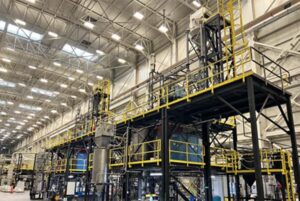NOVONIX Limited has provided an update on production of its anode material from its proprietary, continuous induction Generation 3 Furnaces at its Riverside, Tennessee facility.
 The Company previously reported its high-performance battery-grade synthetic graphite met specification targets from its Furnaces.
The Company previously reported its high-performance battery-grade synthetic graphite met specification targets from its Furnaces.
Production campaigns have been ongoing to provide both operating data and economic insight into this breakthrough technology. In the most recent campaign, material was produced that met all specifications while also reaching the equipment design throughput targets. The Company will continue with production campaigns to collect more operational data and provide mass-production material for sampling to potential customers.
The achievement of these milestones highlights the potential of the Company’s continuous induction Furnace technology in meeting production targets at competitive cost while reaching our high-energy efficiency target with a near zero-emission process.
The Company is updating the engineering for both the process equipment and Riverside facility with an increased production target of up to 20,000 tonnes per annum (tpa), compared to the initial target of 10,000 tpa. This updated throughput will support KORE Power and other prospective customers with whom the Company is in discussions about product qualification, production timelines and potential supply agreements.
The Company expects engineering work to confirm this full facility re-design to be completed in the first quarter of 2024 which will support the continued deployment of additional mass production equipment for the start of commercial production for KORE Power in late 2024.
“The results of our ongoing production campaigns demonstrate NOVONIX’s path to profitable production through our first-in-the-world graphitization furnace technology,” said Chris Burns, CEO of NOVONIX. “Over several production campaigns, the Furnaces delivered in-spec product at a mass scale reaching our target design throughputs. The potential to expand the production output of Riverside to up to 20,000 tonnes per annum is an important opportunity for the Company’s near-term growth plans with significant demand and strong progress in customer development.”
One of the Company’s grades of synthetic graphite produced from the latest production campaigns, GX-23, was analyzed and met all target physical and electrochemical specifications. The below figure shows 130 hours of data from the most recent production campaign completed last week. The continuous output from a single Generation 3 Furnace, producing multiple tonnes of material, was confirmed to meet the target for the degree of graphitization for the product.
Process economics for synthetic graphite are defined by three drivers: raw input costs (primarily needle coke to be supplied through our strategic partner Phillips 66); energy costs from Tennessee Valley Authority (TVA); and operating costs, which include labor and depreciation among other items. Customers require different product specifications which influence the costs. These recent production campaigns demonstrate the Company’s ability to reach competitive cost targets. Currently, the Company is targeting operating margins ranging from 23% to 28% based on estimated sales prices ranging from $7/kg to $10/kg depending on customer product specifications. The Company is continuing to work with government programs for financial support that may further improve NOVONIX’s cost structure such as from the impact of the 45X Advanced Manufacturing Production Credit.
The Company is focused on the buildout of its Riverside facility to maximize its output and economic return and continues to work with the US Department of Energy on possible funding support for its current and future expansions through both grant and loan programs. The Company expects that these achievements will also lead to decreased capital costs for future facilities relative to the Company’s initial estimates.
The timing of future site expansions such as those proposed for North America and Saudi Arabia is dependent on finalized Riverside engineering (expected in the first quarter of 2024), customer off-takes and securing of capital.
